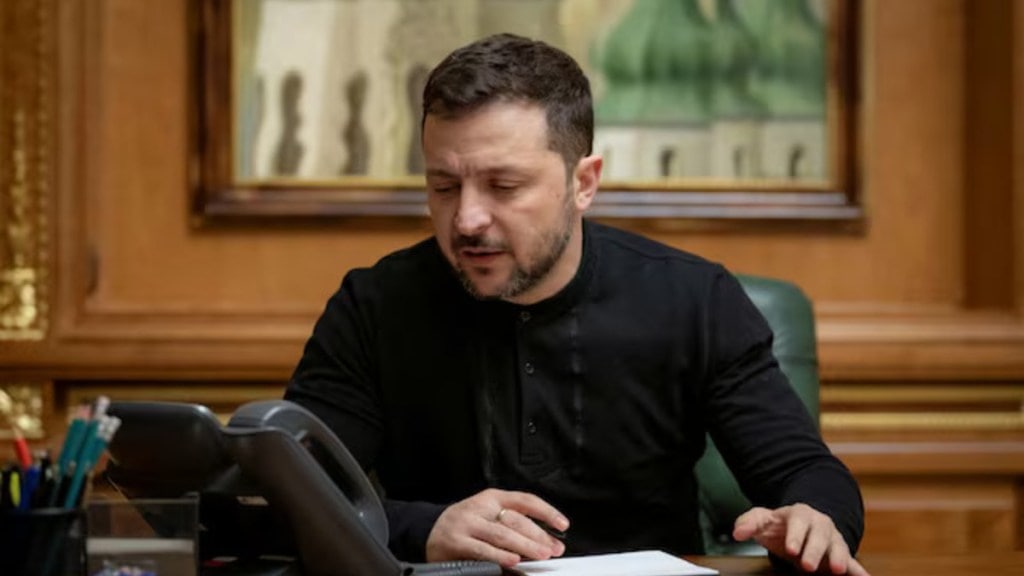As the war in Ukraine enters its third year, President Volodymyr Zelensky’s leadership continues to be questioned both domestically and internationally. Recently, US President Donald Trump called Zelensky a ‘dictator’ due to the ongoing suspension of elections in Ukraine amid martial law, further accusing the Ukrainian leader of having an alarmingly low approval rating. These comments have stirred significant debate, with critics questioning their accuracy and motives.
Speaking on February 18, a day after US and Russian officials met in Saudi Arabia to discuss the conflict, Trump falsely claimed that Zelensky’s approval rating had plummeted to just 4%.
However, Trump’s assertion does not align with the available polling data. According to a survey by the Kyiv International Institute of Sociology (KIIS), conducted between February 4-9, Zelensky enjoys a trust rating of 57%, a notable increase from 52% in December 2024.
This level of support, which remains above 50%, stresses the continued backing for the president despite the ongoing war.
Critics have quickly debunked Trump’s claims, with experts pointing out that the 4% approval rating is a baseless figure, and Zelensky’s true approval is much higher.
Keith Darden, a political science professor at American University who closely monitors Ukrainian politics, stated that the KIIS polling is one of the most reliable sources in Ukraine. “They do not ask ‘approval’ ratings but ‘trust’ in leadership, which is very similar,” Darden explained in an interview with CNN. His comments reflect a broader consensus in Ukraine’s political landscape: Zelensky remains the trusted leader of the country in a time of extreme crisis.
Zelensky himself responded directly to the 4% figure, calling it disinformation likely stemming from Russian sources. “We saw this disinformation. We understand it comes from Russia,” Zelensky said during a press conference on February 19. His remarks highlight the ongoing information warfare being waged against Ukraine and the efforts to undermine his leadership.
Trump’s criticism also aligns with long-standing rhetoric from the Kremlin, which has frequently questioned Zelensky’s legitimacy. Russian officials, including President Vladimir Putin’s spokesperson Dmitry Peskov, have repeatedly stated that Zelensky’s leadership may be compromised by the lack of elections. “Any talks, including with Zelensky, must take into account legal aspects related to his legitimacy,” Peskov said, referring to the Ukrainian president’s term, which was originally scheduled to end in May 2024. However, the war and the declaration of martial law have made elections impossible, prompting the extension of Zelensky’s mandate a move that constitutional lawyers have defended as fully legal under Ukrainian law.
The complexities of holding elections during wartime are compounded by the logistical challenges of Ukraine’s displacement crisis. According to United Nations (UN) figures, over 6 million Ukrainians have fled the country, and another 3.6 million are internally displaced. With nearly 18% of Ukrainian territory under Russian control, conducting an election that respects democratic principles, such as the secret ballot and equality for all citizens, would require significant time and resources.
Olha Aivazovska, head of the election watchdog Opora, noted that restoring the electoral infrastructure could take up to a year after the war end, especially as many voting facilities, including schools, have been destroyed.
In the meantime, Zelensky’s approval among Ukrainians remains resilient. Although his approval rating has fluctuated since the start of the war, it remains consistently higher than the numbers Trump and the Kremlin claim. In fact, his trust rating even surged to 90% early in 2022, when the invasion first began, and while it has dipped slightly, it is still well above the 4% figure falsely attributed to him.
Polling data from other sources further confirms this support. A survey conducted by Professor Olga Onuch at the University of Manchester found that 63% of Ukrainians either fully or tend to approve of Zelensky’s actions as president. Similarly, Tymofiy Mylovanov, president of the Kyiv School of Economics, emphasized that his lowest approval rating before the war was never close to the 4% figure and typically hovered around 26%.


